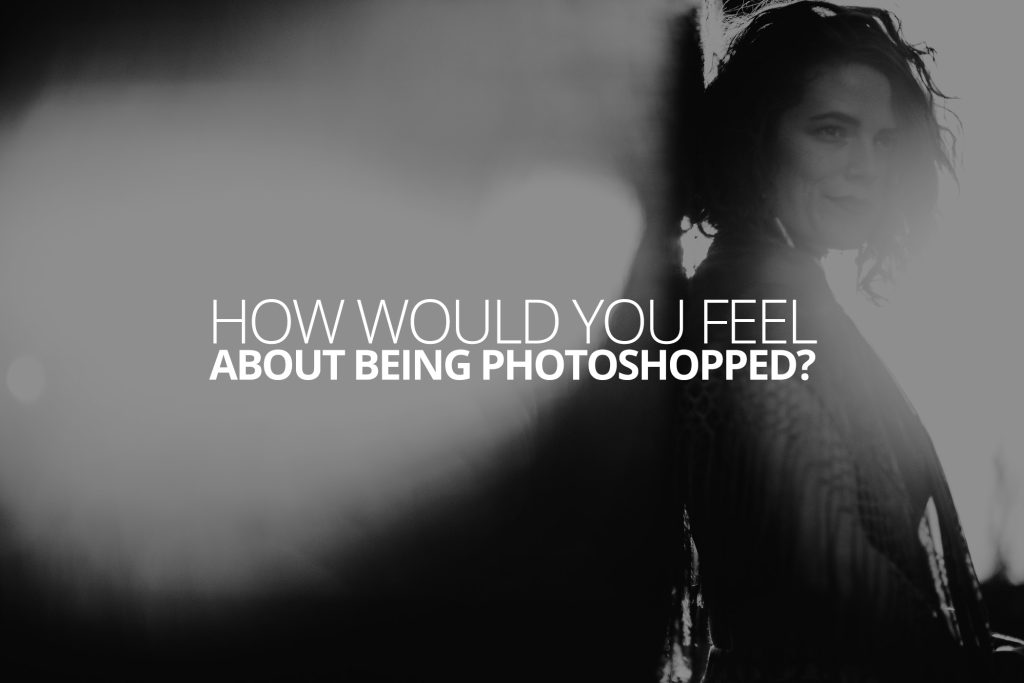We hear a lot about the perils of photoshopping human bodies from the pages of big company’s press releases, and we hear stories of hurt feelings and jaded self images from people who underwent the digital knife. And most of all, we hear lots and lots of people — and women in particular — tell of struggling to feel okay with themselves after a complete inundation of perfectly photoshopped, idealized bodies. Of course, once in a while the stories are good. For example, a photographer repairing some painful disfigurement in a special photo for the survivor of some tragic event. More often though, it’s not so good, and occasionally — much more often than it reasonably should — it’s downright tone deaf. Like arbitrarily lightening the skin tone on a person with naturally darker skin, and slimming the figure on someone who is perfectly satisfied with their weight and the way they look.
Now, the truth is that photo editing software is just a tool, and there is nothing inherently wrong with changing a person’s figure, smoothing skin, or even going all out and turning your subjects into some kind of nightmarish plastic caricatures of themselves. Like all tools, it’s about where, when, why and how they are used and what they are used on.
At Petruzzo Photography, we take a light touch toward modifying the way a person looks. We’ll remove distracting, non-permanent blemishes by default, and we might smooth skin or obscure wrinkles if some quality of the light makes them appear much more pronounced in the images than they do in real life. But these things are small potatoes compared to what a skilled retoucher can accomplish. When I ask how you would feel about being photoshopped, I’m not asking if you’d like me to remove the zit that popped up over night right in the middle of your forehead. That’s almost surely a given. No, I’m asking how you’d feel if I made your neck longer, your arms thinner, your thighs slimmer or chest larger. I’m asking how you would feel about being altered to look more like some ambiguous cultural ideal.
You know what they say about assuming
Fantasy is fun. It’s fun to be able to see a different version of ourselves in an image. Just look at all the people making their eyeballs huge with Snapchat filters. Seeing goofier, sexier, fancier, or more heroic depictions of ourselves is fun, and the benefits of being photoshopped aren’t altogether different from this kind of fun.
But I think Photoshop’s bad rap has come mostly from assumptions made and expectations defied; the violation of trust that a photographer—a separate human being—relies on to do their job. When some dim-witted photographer works with an overweight couple and photoshops them to look thinner, they betray a kind of judgement that no one wants, or should have to feel. Often that photographer thinks they’re doing something nice. But really, even thinking of it as something nice, means the photographer must have assumed the subject didn’t like the way they looked, or worse, that thin is an inherently better way to look.
Who wouldn’t be a little personally offended by that? I’m bald, and if hired someone for a headshot and they photoshopped hair onto my head I would wonder what they think is wrong with being bald.
That violation of trust exists at a higher level too. Companies in the health, fitness and beauty industries show pictures of human bodies no healthy person could attain and it forces their customers to pit their self-image against their own desires for health, fitness and beauty. Thanks to Photoshop, no one in a taco bell ad has ever looked the way I felt while eating it. I jest, but that should be at least a little unnerving to almost everybody.
Recollection Retouching
In that last section I made photographers with a penchant for photoshop look pretty bad. But, as I said before, it’s just a tool and those where, when, why, and how questions are ultimately what matters most.
Many photographers employ Photoshop stylistically to do what’s sometimes referred to as ‘recollection retouching. That’s the process of making the final image reflect the recollection of the session or the setting or the mood. In this case, a photographer might remove a person’s double chin if it appears prominently in the photo, but went entirely unnoticed while actually shooting, or they might slim hips if they create the illusion of a more protruding shape against a high contrast background, or they might elongate your neck if your otherwise good posture appears slouchy from a preferred angle. They might even lighten skin or create a smirk where they was none before. As long as the retouching reflects something authentic from their interaction with you or the session itself, a photographer may consider it fair game.
Well, let me revise that a little bit. As long as it reflects something authentic and you are on board with it.
Open Communication, a Return to Trust
The biggest issue with Photoshop is not photoshop, or what it can do. It’s with photographers failing to communicate with their subjects openly about what they can do and what they plan to do.
When you hire a photographer for your family, engagement session, or headshots. You’re not asking for their critique on your appearance, or your body. You’re asking them to help you look your best, to capture some intangible quality and to help represent you in a flattering and effective light. And perhaps part of that is to help idealize some things for you—perhaps you’ll have lost a bunch of weight before your wedding and would rather your engagement photos not forever be a reminder of your weight at that time. That’s a perfectly acceptable reason to go under the ‘digital knife’. But it’s probably not something your photographer should be conjuring up for you, or suggesting you need, and especially not without some good, open conversations about what you want from these photos.
I believe all of this is true in as much as you have hired a photographer to make something with you; something that is supposed to improve your life. Now, if you’ve simply volunteered to sit for a photographer and they decide the photo they want to make is of some super skinny, glossy-alien kind of look in their photo—well, that’s just their art. It might be great, or it might be crap, but you shouldn’t hook your self-image up to it either way. Don’t hang any kind of esteem on some photographer’s crappy art. That’s just a bad idea. Besides, in all likelihood almost no one is going to see what they made anyway.
But if you have been hired by some photographer or ad agency, then maybe it’s appropriate to find out what kind of retouching they’re going to do. You really should know how your body will be used to influence people and the things they do, the places they go, and how they feel about themselves.
So Decide How You Feel
This question of how you feel about being photoshopped is more relevant to some people than to others. Models for example, have an almost ethical obligation to think about it and make a decision. Someone getting family portraits, quite a lot less so. But, we live in a digital world where almost anything is possible. A single photo can become practically anything, and knowing where you stand for yourself can save some heartache and even help change the culture’s course toward openness and acceptance.
Before you work with a photographer in any capacity, whether as a client or a model, find out how they use Photoshop and have a frank discussion about your feelings.
If you find yourself in a situation where a photographer has taken liberties with how your body looks, first remember they probably meant well but failed. This is your opportunity to correct them and help make them more responsible image creators. And, if they can’t or won’t understand your objection, or worse, they attack you for the parts of your body changed in a photo, get on the internet put them on blast… We’ll back you up.

